Spotlight

Social Business: Young Voices
Elita Karim
Photol: Kazi Tahsin Agaz Apurbo
Eradicating poverty -- this is probably the single most action that will change the world, says economist and Nobel Laureate Muhammad Yunus. During the Social Business Day on June 28 this year, a special segment was organised specially for students by the Yunus Centre, where students from Bangladesh, along with students video conferencing from other countries in Asia, had the opportunity to converse with Professor Yunus regarding this innovative form of business.
Social Business, according to www.yunuscentre.org is a "cause-driven business. In a social business, the investors/owners can gradually recoup the money invested, but cannot take any dividend beyond that point. Purpose of the investment is purely to achieve one or more social objectives through the operation of the company, no personal gain is desired by the investors. The company must cover all costs and make profit, at the same time achieve the social objective, such as, healthcare for the poor, housing for the poor, financial services for the poor, nutrition for malnourished children, providing safe drinking water, introducing renewable energy, etc. in a business way."
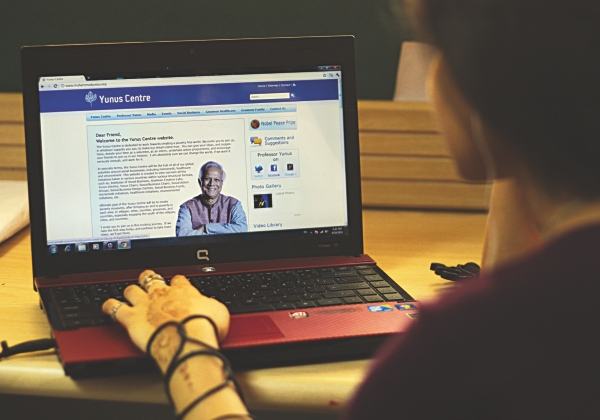
"It is pretty simple actually," explains Professor Yunus. "You pick a problem that makes the country think about -- population growth, unemployment, providing education and so forth. You pick one of these, get together with friends and start a business which will help the society, or in other words, start a social business." In a nutshell, Professor Yunus stresses on the young people in the country to take on the task of eradicating poverty from Bangladesh.
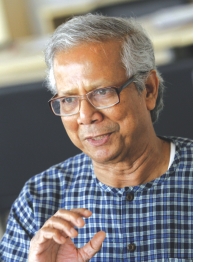 |
Photo : Star |
"Social Businesses can make profits, but that is not the primary goal of a social business," clarifies Professor Yunus. "Even social businesses are allowed to make profit with the condition that profit stays with the company; the owners will not take profit beyond the amount equivalent to investment." According to him, social business bring a new dimension to the business world, and a new feeling of social awareness among the business community.
While speaking to a few students about the concept of social business and how they would employ it to eradicate the issue of poverty and so, some of them came up with brilliant ideas. While some expressed their concerns on how to protect the city in case of a sudden earthquake, others thought about starting small garment factories after training women in handicrafts and embroidery work.
One business that can be run in every colony or area in Bangladesh, as suggested by Sanjida Tasneem Pia, a medical student, is starting schools for domestic workers. "These schools can be for both underage workers and adults," she explains. "Even though the idea goes against the child labour laws, unfortunately there are still thousands of children in the country today who have to work for a living. A large percentage of them work in homes as domestic workers or help. These children wash and cook for survival, but they are always looking for a better life, for a healthier future, which they can achieve only through education." Pia adds that a common design can be followed in all the areas, if the design proves to be successful. "This is definitely a job for the young people in the area!" says Pia. "A few students can get together and start a school for the domestic workers in a particular area. I know of a group who started to teach on the roof top of someone's house. The domestic workers would get together for two hours every day -- 3 pm to 5 pm -- and would be taught how to read and write. If there is a local school in the area, the students can probably request the school authorities to allow them to use one of the rooms after school hours to teach these domestic workers. In fact these make shift schools can also teach adult domestic hours for a couple of hours every day." To turn this into a social business, Pia says that these students can pay 20-30 takas a month, which will in turn help to buy books, papers and pens for them. "Furthermore, paying this amount will also let the domestic workers feel responsible and in some cases, maybe even feel proud of spending their earnings for their own betterment."
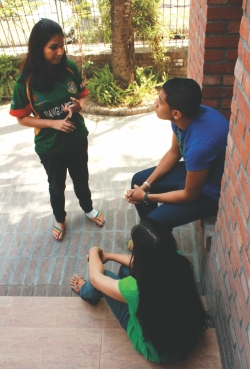 |
| Young minds are the hub for fresh ideas. |
Zayed Hassan Onik, a 21-year-old law student, says that a burning issue today in the country is the ever-increasing population. "Dhaka city is overcrowded today, simply because the level of employment is very low in cities and areas outside Dhaka," he says. "Therefore, in Dhaka both the streets and the pavements are crowded; you can't walk, neither can you drive to work or take a public transport. If I were given an opportunity to start a social business, I would probably try to start an organisation online, through which I would make a list of jobs and employment opportunities available in different parts of the country and try to come up with suitable matches amongst the unemployed." Working almost like a job search portal online, Onik says that his portal would be a little different than the others. "Firstly, I would tag up with as many students as possible all over the country," he explains. "Moving district and city wise, groups of students would have to work on finding employment opportunities and at the same time upload the profiles of unemployed individuals on the portals, paying a small fee to register online; starting from technicians, farmers, carpenters to creatives, copywriters and top company executives. This is a huge project and can be possible only if student groups from different universities can get involved. Secondly, because many of the unemployed and small companies might not have access to the internet, the same students would have to assist them in uploading their profiles online. In a nutshell, if this design can be modified and implemented, existing jobs will be discovered in small cities and districts outside Dhaka, new jobs will be created and the unemployed would not have to come all the way to the capital looking for work. They will be able to find something in their home towns."
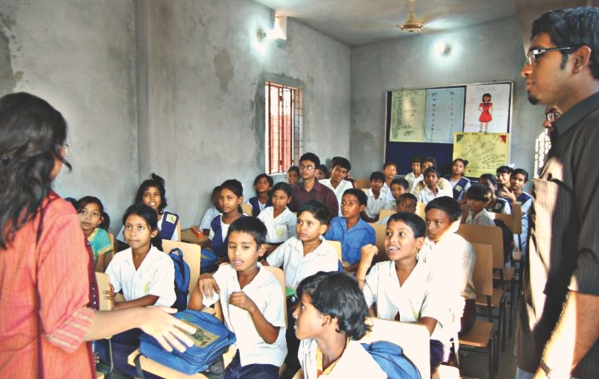
Schools can be for both underage workers and adults, Courtesy : Jaago Foundation.
"Transporting oneself from one area to another in Dhaka city is a huge problem, and I would like to solve this problem using Social Business," says Tahmina Shams, a BBA student at North South University. "Because students are younger and stronger, and of course because they have more time on their hands as compared to the elders, I believe that they are the ones who should do something to solve this problem. After all, they are also the future of the nation." Tahmina stresses on car pooling, a concept used in many countries, as a solution to the ever-worsening traffic problems in Dhaka. "Of course there are public buses and 'riders' available on the streets, so one may ask as to why go into all this trouble?" she explains. "Firstly, the public transport available in the country is not safe, nor is it dependable. Secondly, the car pooling design would work area wise and charge a small fee from students, workers and those who just want to go shopping for groceries. If the number of vehicles per area moving into the streets of Dhaka decreases, that would definitely ease the streets as well, not causing any traffic jams or long waits."
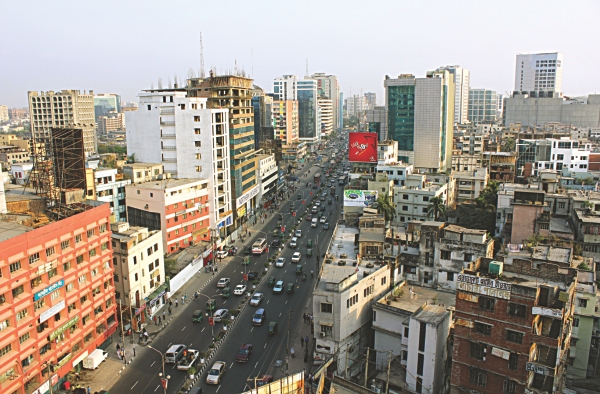
Social Bussiness can play a role in overcoming transport issues today.
And there were lots more. The students are ready and moving with their ideas. The young people in Bangladesh do want to see a healthy and safe society. They only await the platform that the authorities will build for them, to let them practice their ideas of running their businesses so as to build a stronger and a more intelligent society.
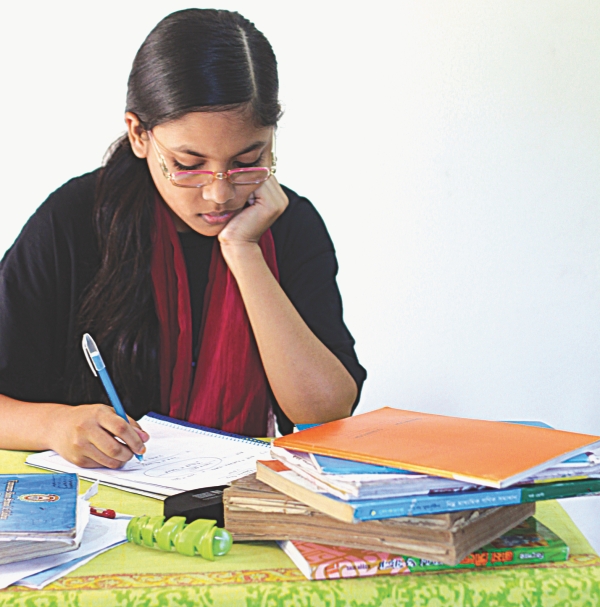
|
|
|
